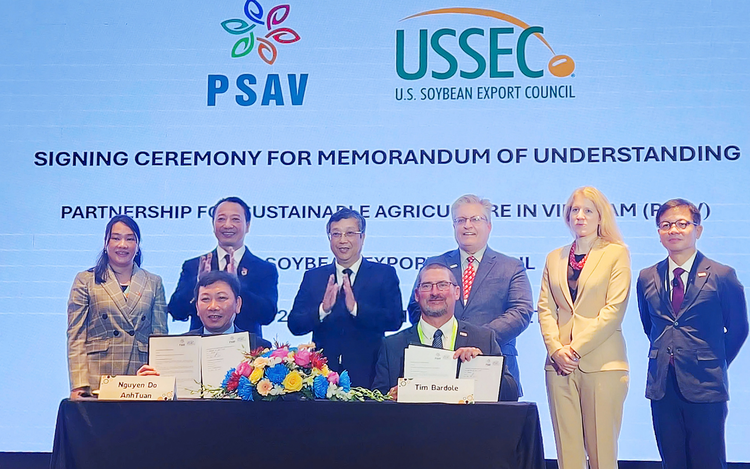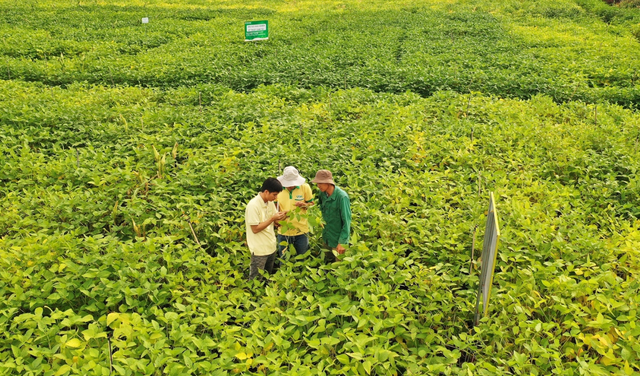
Representatives of the Partnership for Sustainable Agriculture in Vietnam and the United States Soybean Export Council sign a memorandum of understanding to boost U.S. soybean shipments to Vietnam. Photo: HP
At a ceremony in Ho Chi Minh City on Wednesday morning marking 30 years of partnership between the U.S. Soybean Export Council (USSEC) and Vietnam, relevant parties highlighted the long-standing cooperation and future opportunities.
As part of the event, USSEC and the Partnership for Sustainable Agriculture in Vietnam signed a memorandum of understanding to strengthen bilateral trade, promote cooperation, and support Vietnamese importers in accessing U.S. soybean products.
Data from the General Department of Vietnam Customs indicated in the first quarter of 2025, the U.S. exported over 414,000 metric tons of soybeans worth more than US$186 million to Vietnam, up 47 percent in volume and 19 percent in value year on year.
Last year, Vietnam imported over 2.2 million metric tons of soybeans, valued at nearly $1.1 billion.
The Southeast Asian nation is expected to ramp up its soybean purchase in 2025.
The higher demand is driven by expanding livestock and aquaculture feed industries.
As the world’s sixth-largest pork producer and fourth-largest seafood exporter, Vietnam needs a large quantity of soybean meal.
The burgeoning pet food industry in Vietnam is also contributing to soybean demand.
USSEC predicted that the sector would double in size by 2028.
Timothy Loh, USSEC’s regional director for Southeast Asia and Oceania, praised Vietnam’s robust food and feed development, stating the USSEC–Vietnam ties are built on trust and long-term cooperation.

A soybean field in Vietnam. Photo: QNS
Complementary agricultural trade
The agricultural relationship between Vietnam and the U.S. is complementary rather than competitive, said Nguyen Do Anh Tuan, head of the International Cooperation Department under the Ministry of Agriculture and Environment.
The partnership has helped form integrated supply chains that benefit mutual development.
Tuan warned that trade interventions, such as retaliatory tariffs, could harm both sides.
“If the U.S. imposes high tariffs on Vietnamese agricultural products, reducing their competitiveness, it will also face challenges exporting to Vietnam,” he said.
Between 2016 and 2024, agricultural trade between the two nations grew steadily at 10 percent annually.
In 2024, the U.S. exported some $3.4 billion worth of crop and livestock products to Vietnam, while Vietnam shipped around $2.8 billion in similar goods to the U.S., giving the U.S. a trade surplus in this category.
Vietnam levies zero import tariffs on U.S. soybeans and soybean meal.
Despite being an agricultural country, Vietnam’s soybean cultivation covers only about 20,000 hectares, a fraction of its domestic demand, making imports essential.
According to USSEC, the growth of Vietnam’s feed manufacturing industry, the opening of local soybean crushing plants, and relaxed trade policies will sustain the momentum for U.S. soybean exports.
However, Vietnam is still facing challenges such as high feed production costs and heavy reliance on imported raw materials.
In early June, Minister of Agriculture and Environment Do Duc Duy led a delegation to the United States, where agricultural import agreements worth nearly $3 billion were signed.


Max: 1500 characters
There are no comments yet. Be the first to comment.